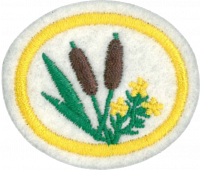Difference between revisions of "AY Honors/Edible Wild Plants/Requirements 2"
m |
m |
||
| Line 6: | Line 6: | ||
<b>2. <section begin=req2 /><noinclude><translate><!--T:2--> | <b>2. <section begin=req2 /><noinclude><translate><!--T:2--> | ||
| − | </noinclude>Identify in the wild five trees and five shrubs that are edible. | + | </noinclude>Identify in the wild five trees and five shrubs that are edible. |
<noinclude></translate></noinclude><section end=req2 /></b> | <noinclude></translate></noinclude><section end=req2 /></b> | ||
| Line 24: | Line 24: | ||
:<b>b. <section begin=req4b /><noinclude><translate><!--T:6--> | :<b>b. <section begin=req4b /><noinclude><translate><!--T:6--> | ||
| − | </noinclude>Frying | + | </noinclude>Frying |
<noinclude></translate></noinclude><section end=req4b /></b> | <noinclude></translate></noinclude><section end=req4b /></b> | ||
Revision as of 19:23, 13 April 2021
Skill Level
2
Year
1970
Version
11.02.2026
Approval authority
North American Division
1. Photograph, collect pictures of or sketch fifteen edible wild plants. Identify each plant in the wild.
2. Identify in the wild five trees and five shrubs that are edible.
3. Identify, prepare, and eat three kinds of wild berries or fruits, three kinds of beverages, three salad plants, three potherbs (greens), and two tubers or roots.
4. Demonstrate the preparation of wild foods in each of the following ways:
- a. Boiling
- b. Frying
- c. Roasting
- d. Baking
5. Demonstrate how to prepare four parts of the common milkweed or day lily for food.
6. What root plant can be dried and ground into meal?
7. Complete the following:
- a. Know at least 8 families embracing the poisonous or doubtful plants.
- b. Determine whether any of the plants you plan to eat have poisonous look-alikes and be able to distinguish them.
- c. List three plants that are safe to eat in small quantities. What makes eating large portions of these plants risky?
- d. Name at least one plant that contains both edible and poisonous parts. Which parts are edible? Which parts are poisonous, and why?
8. The cardinal edibility rule is to never eat any wild plant unless you have positively identified it and know that it is edible. Discuss the importance of this rule.


